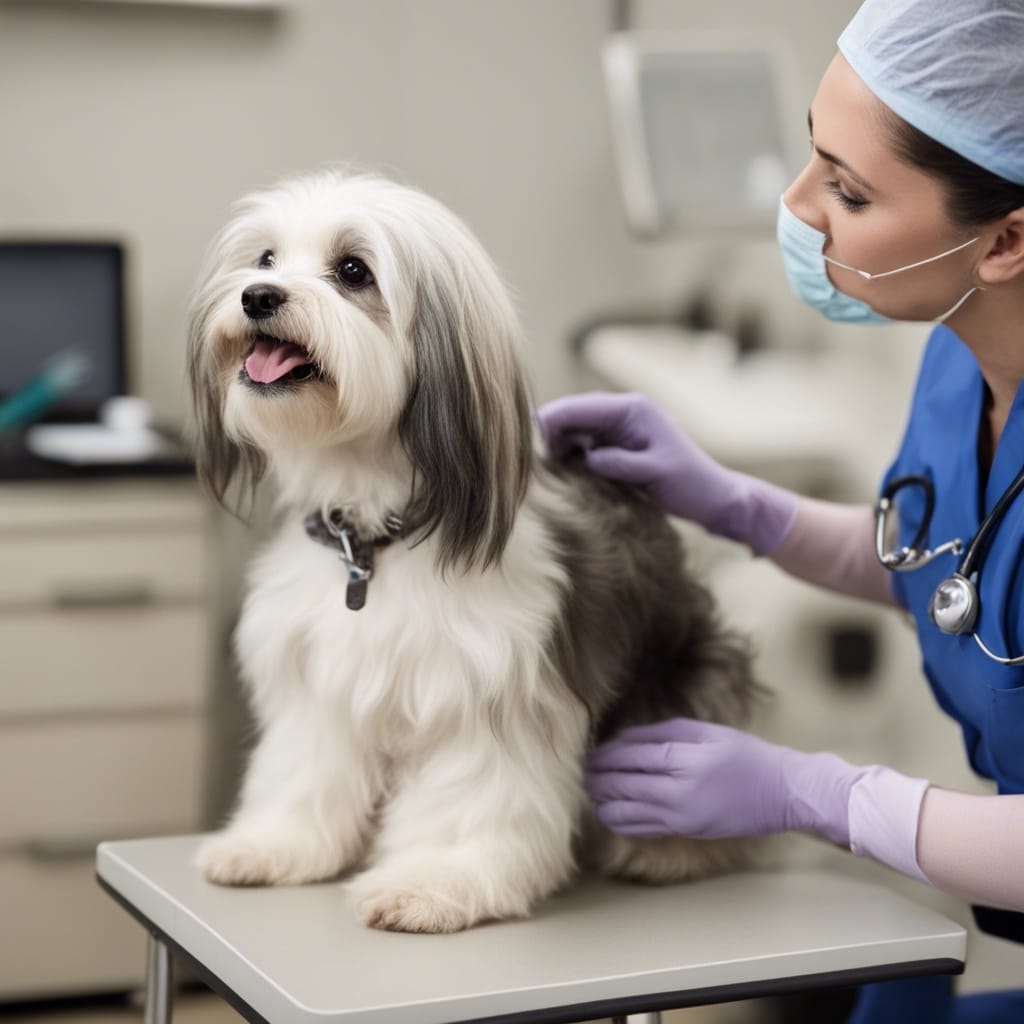
Do you know about the mysterious illness that has been affecting dogs across multiple states? If not, you’re about to find out.
Key Points
- A mysterious respiratory illness is affecting dogs across multiple states, causing concern among pet owners and veterinarians. The cause of the illness is still unknown, and researchers are working to identify it.
- Symptoms of the illness include persistent coughing, sneezing, and red, runny eyes, which can progress to pneumonia if left untreated. While there is little evidence to suggest that humans can contract the illness, caution is advised.
- Possible reasons for the increased cases of the mystery dog illness include the prevalence of respiratory infections among dogs and the misuse or overuse of antibiotics and steroids in their treatment. Following evidence-based guidelines for diagnosis and treatment is important to prevent the spread of the illness.
This perplexing dog illness has caused concern among pet owners and veterinarians alike, as its cause remains unknown. The American Veterinary Medical Association is urging vets to report any cases they come across, while researchers tirelessly work to identify the culprit behind this enigma.
Symptoms of this illness include persistent coughing, sneezing, and red, runny eyes, which can progress to pneumonia if left untreated. Although there is little evidence to suggest that humans can contract this illness, extra caution is advised, especially during the holiday season.
Stay informed, keep your dog’s vaccinations up-to-date, and seek immediate veterinary care if any concerning symptoms arise.
Possible Reasons for Increased Cases
If you’re wondering why there’s been an uptick in cases of the mystery dog illness, there are several possible reasons to consider.
One potential factor is the increased prevalence of respiratory infections among dogs. These infections can be caused by various pathogens and can lead to symptoms such as coughing, sneezing, and nasal discharge.
Another reason could be the misuse or overuse of antibiotics and steroids in the treatment of these respiratory infections. Improper use of these medications can contribute to the development of antibiotic resistance and may not effectively treat the underlying cause of the illness.
It’s important for veterinarians and dog owners to follow evidence-based guidelines for the diagnosis and treatment of respiratory infections in order to prevent the spread of the mystery dog illness and ensure optimal outcomes for affected dogs.
Research and Identification Efforts
Researchers and scientists are actively working to identify the cause of the mystery dog illness and develop effective strategies for diagnosis and treatment.
Scientists at the University of New Hampshire have identified a novel bacterium as a possible cause, but further confirmation is needed. Researchers at other centers, including Oregon State University, Colorado State University, and the University of Pennsylvania, are also investigating the outbreak.
Lack of a single group tracking pet illnesses in the U.S. is slowing down research efforts. Coordination between veterinarians, government agencies, and researchers is being done to gain more insight into the situation.
Financial constraints prevent many owners from seeking veterinary care or diagnostic testing for their sick dogs. It’s crucial to continue research efforts to identify the cause and develop effective treatment options for affected dogs.
Dogs at Increased Risk

Brachycephalic or flat-faced dog breeds, such as French bulldogs or pugs, are at an increased risk of the mystery dog illness. Senior dogs or dogs with underlying lung disease are also more susceptible. Interestingly, cases of atypical respiratory disease have been observed in young, vaccinated dogs, which is unusual. Some dogs tested positive for known pathogens, while others showed no signs of any pathogen. This indicates that there may be multiple factors contributing to the illness.
It’s crucial for owners to know their dogs and recognize when something seems off. Symptoms of the canine respiratory infection include coughing, sneezing, and red, runny eyes. While most dogs will recover on their own, difficulty breathing or loss of appetite may indicate a more serious problem and require prompt veterinary attention.
Symptoms of Canine Respiratory Infection
If your dog is experiencing a canine respiratory infection, you may notice symptoms such as coughing, sneezing, and red, runny eyes. These are common signs of respiratory illness in dogs.
Most dogs will recover on their own, but if your dog is having difficulty breathing or has a loss of appetite, it may indicate a more serious problem. Veterinarians have reported higher numbers of dogs with respiratory illness, and some cases have progressed to pneumonia.
It’s important to monitor your dog closely and seek veterinary care if necessary. Prompt treatment with antibiotics and other medications can help dogs recover.
Treatment and Recovery

Seek veterinary care promptly for your dog’s treatment and recovery from respiratory illness. Dogs with severe respiratory illness may require hospitalization and supportive care. The costs for severe cases can range from $15,000 to $20,000. Prompt treatment with antibiotics and other medications can help dogs recover. Monitoring through chest X-rays may be necessary to ensure the effectiveness of treatment.
While most dogs will recover on their own, difficulty breathing or loss of appetite may indicate a more serious problem. Owners shouldn’t panic, as the number of cases may not be as high as perceived on social media, but vigilance is still important. It’s crucial to follow the recommendations of veterinarians and take necessary precautions to protect your dog from respiratory illness.
Spread and Impact
Taking extra care during the holiday season is crucial to prevent the spread and impact of the mysterious respiratory illness affecting dogs. The disease has been reported in at least 14 states, with Oregon alone reporting around 200 cases. Other states, including California, Colorado, Florida, Georgia, and more, also have unknown case numbers. While there’s little indication that the disease can spread to humans, veterinarians are warning dog owners to be vigilant.
The American Veterinary Medical Association has increased public advisories for the holiday season to raise awareness. The spread of the illness is being investigated by various research centers, including the Oregon Department of Agriculture and the Colorado State University College of Veterinary Medicine. Further research is needed to determine the cause and potential impact of this atypical disease.
Investigation and Link to Pneumonia
To better understand the mysterious respiratory illness affecting dogs and its potential impact, researchers are investigating the link between the disease and severe pneumonia cases. The Oregon Department of Agriculture is collaborating with diagnostic laboratories to identify the cause of the outbreak.
The Colorado State University College of Veterinary Medicine has found a connection between the disease and severe pneumonia, which has resulted in some deaths. This outbreak is considered atypical due to the unknowns surrounding it. Researchers in New Hampshire are specifically investigating a new bacterium that could be responsible.
It’s worth noting that antibiotics haven’t been effective in treating the illness thus far. The investigation aims to uncover more information about the disease and its link to pneumonia, providing crucial insights for effective treatment and prevention strategies.
Recommendations for Dog Owners
Dog owners are advised to ensure their pets are up-to-date on vaccinations to protect against the mysterious respiratory illness. This is a crucial preventive measure that can significantly reduce the risk of infection.
Additionally, it’s important to seek veterinary care as soon as symptoms appear, such as coughing, sneezing, nasal and eye discharge, and fever. Prompt diagnosis and treatment can help prevent the progression of the illness and improve the chances of recovery.
During the holiday season, extra care should be taken to minimize exposure to other dogs, especially when traveling or placing them in kennels. Avoiding dog parks, grooming facilities, and doggy daycares can also help reduce the risk of transmission.

Conclusion
In conclusion, the recent uptick in mysterious respiratory illness among dogs is a cause for concern among dog owners and veterinarians. The American Veterinary Medical Association is actively working to identify the cause of this enigmatic disease.
Symptoms include persistent coughing, sneezing, and red, runny eyes, which can progress to pneumonia if left untreated. While the illness doesn’t appear to spread to humans, caution is advised.
Dog owners should stay informed, ensure vaccinations are up-to-date, and seek immediate veterinary care for any concerning symptoms.
- About the Author
- Latest Posts

Sara is a passionate writer and an avid lover of Havanese dogs. With several years of experience in dog training, breeding, and care, she has developed a deep understanding and admiration for the Havanese breed. Sara’s mission is to provide valuable insights, resources, and tips to help Havanese dog owners provide the best possible care and nurturing for their beloved pets.







